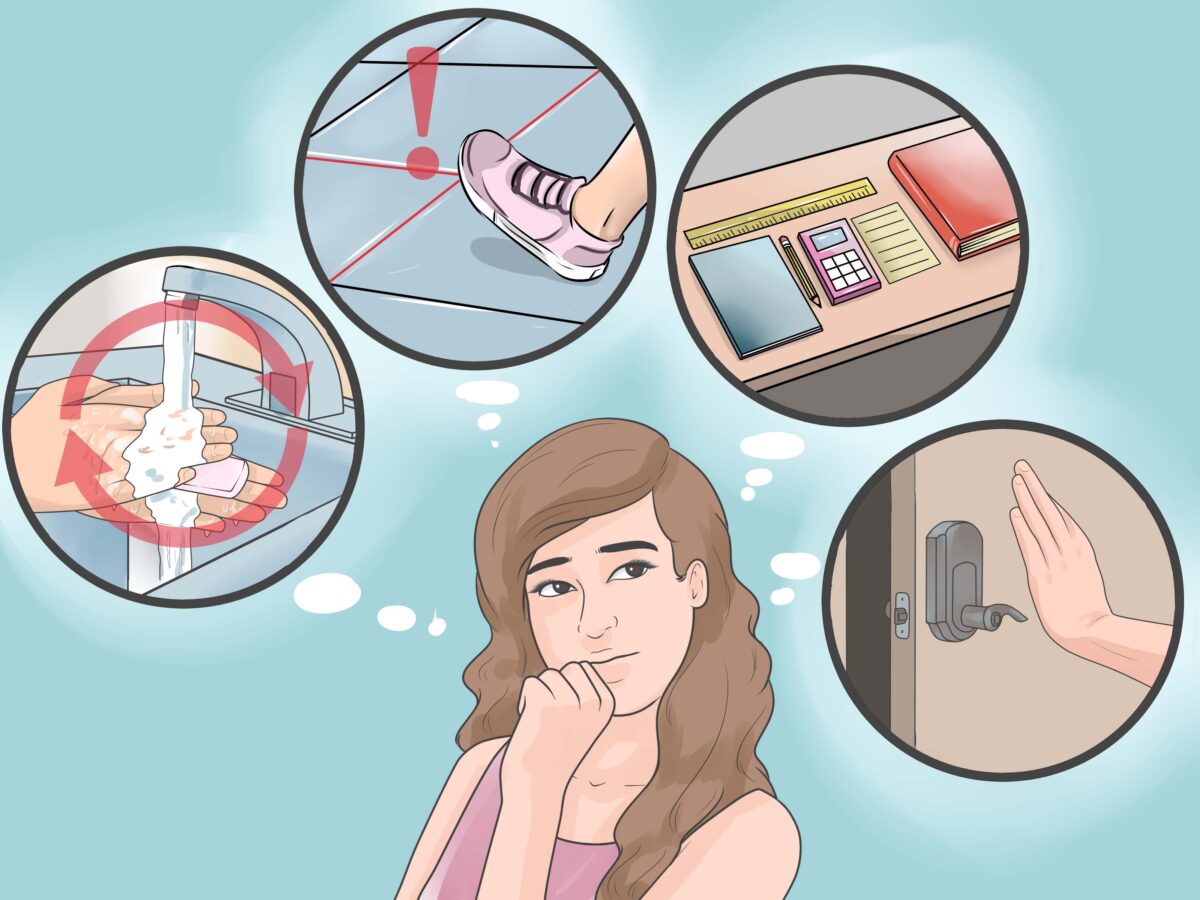Dr. Soumiya Mudgal2023-02-23T12:53:14+00:00
Obsessive Compulsive Disorder (OCD) is a mental health disorder characterized by intrusive, unwanted thoughts, images, or urges (obsessions) that cause significant distress and anxiety, as well as repetitive, ritualistic behaviors or mental acts (compulsions) that individuals engage in to alleviate that anxiety.
The obsessions and compulsions associated with OCD can take many different forms, but some common examples include:
- Fear of contamination or germs, leading to excessive washing or cleaning
- Obsessive thoughts about harm coming to oneself or others, leading to repetitive checking behaviors
- Persistent doubts or uncertainty, leading to repetitive reassurance-seeking behaviors
- Symmetry and orderliness, leading to compulsive arranging or rearranging of objects
- Intrusive sexual, violent, or blasphemous thoughts or images, leading to avoidance or mental rituals
OCD can significantly interfere with an individual’s daily life and relationships and may lead to depression, anxiety, and social isolation. Treatment typically involves a combination of medication (such as antidepressants) and psychotherapy (such as Cognitive Behavioral Therapy), as well as other forms of support like support groups.
Obsessive Compulsive Disorder Causes
The exact causes of Obsessive Compulsive Disorder (OCD) are not fully understood, but research suggests that a combination of genetic, biological, and environmental factors may play a role. Here are some potential causes:
Genetics: OCD tends to run in families, and research suggests that certain genetic variations may increase an individual’s risk of developing the disorder.
Brain chemistry: Studies have found that people with OCD may have abnormalities in certain areas of the brain, particularly in the circuits that regulate mood and anxiety.
Environmental factors: Traumatic events or stressors, such as abuse or illness, may trigger or worsen OCD symptoms in some individuals.
Cognitive factors: Some individuals with OCD may have a tendency to engage in excessive or negative thinking patterns, which can exacerbate their obsessions and compulsions.
It is important to note that while these factors may increase an individual’s risk of developing OCD, they do not necessarily cause the disorder. OCD is a complex condition, and the causes may vary from person to person.
Obsessive Compulsive Disorder Treatments in Delhi
The (OCD) Obsessive Compulsive Disorder Treatment in Delhi typically involves a combination of medication, psychotherapy, and other forms of support. Here are some common treatment options:
Cognitive Behavioral Therapy (CBT): CBT is a form of talk therapy that focuses on identifying and changing negative thought patterns and behaviors. Exposure and Response Prevention (ERP) is a specific type of CBT that is particularly effective for OCD. As per Dr. Soumiya Mudgal Psychiatrist in Delhi, It involves gradually exposing individuals to the situations that trigger their obsessions while preventing them from engaging in their compulsive behaviors.
Medication: Antidepressants, specifically selective serotonin reuptake inhibitors (SSRIs), are often used to treat OCD. These medications can help reduce the symptoms of anxiety and obsessions.
Mindfulness-Based Therapies: Mindfulness-based therapies like Mindfulness-Based Cognitive Therapy (MBCT) and Acceptance and Commitment Therapy (ACT) can help individuals learn to accept their obsessions and compulsions without judgment, and develop greater psychological flexibility.
Support Groups: Support groups, such as the International OCD Foundation or local OCD support groups, can provide individuals with a sense of community and support.
In the Obsessive Compulsive Disorder Treatment in Delhi research, It is important to note that the most effective treatment approach for OCD is usually a combination of medication, therapy, and support. Treatment can take time and require patience, but with appropriate care, most individuals with OCD can achieve significant improvement in their symptoms and overall quality of life.
Why Choose Psychiatrist Dr. Soumiya Mudgal to Treat Obsessive Compulsive Disorder?
Choosing a psychiatrist to treat Obsessive Compulsive Disorder (OCD) can be beneficial for several reasons:
Medical expertise
Psychiatrists are medical doctors who are trained to diagnose and treat mental health conditions, including OCD. They have the expertise to determine whether medication is appropriate for managing OCD symptoms, and can prescribe and manage medications as needed.
Specialized knowledge
Psychiatrists have specialized training and knowledge in treating OCD specifically. The Psychiatrist Doctor in Delhi is familiar with the latest research on the disorder, as well as the most effective treatment options available.
Co-occurring conditions
OCD often co-occurs with other mental health conditions, such as depression, anxiety, or bipolar disorder. Psychiatrists are equipped to address these co-occurring conditions, as well as any potential medication interactions. Continuity of care: Because psychiatrists are medical doctors, they can provide ongoing care and monitoring for individuals with OCD, ensuring that treatment is adjusted as needed over time.
Treatment You May Also Like:
> Schizophrenia Treatment in Delhi
> Depression Treatment in Delhi
> Mood Disorder Treatment in Delhi
Final Advice
It is important to note that while psychiatrists can provide valuable expertise in treating OCD, other mental health professionals such as psychologists or licensed therapists may also be qualified to provide effective treatment for OCD. The most important thing is to find a mental health professional who is knowledgeable about OCD and with whom you feel comfortable working.

